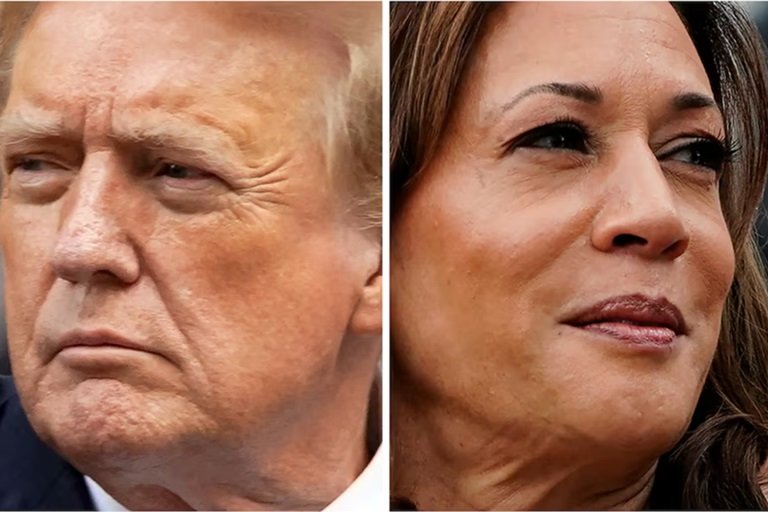America’s election day has arrived, and tens of millions of people will cast ballots in one of the most important and close races in recent US history on Tuesday.
National opinion polls have not moved in weeks, giving the impression that Democratic candidate Kamala Harris and Republican opponent Donald Trump are engaged in a close race.
The situation was the same in the seven pivotal swing states: Michigan, Wisconsin, Pennsylvania, Arizona, Nevada, Georgia, and North Carolina. Though most experts think that whoever wins the Rust belt state of Pennsylvania is likely to have a clear edge, recent polling has failed to identify any apparent pattern or advantage for either Trump or Harris in this electoral battleground.
During a hectic last day of campaigning in the state, Trump, 78, declared at a rally in Reading, in the southeast corner of the state, “If we win Pennsylvania, we win the whole ball of wax.” He later presented the election in Pittsburgh as a contest between “four more years of misery, failure, and disaster” under Harris and “a golden age of America” if he were to return to the White House.
The 60-year-old Harris began Monday in Pennsylvania and concluded in Philadelphia, where she was joined by Lady Gaga, a singer, and Oprah Winfrey, a television personality who cautioned about the danger that Trump poses to democracy. “We can’t afford to miss this one,” Winfrey declared. “It is very possible that we will never be able to vote again if we do not appear tomorrow.”
The election will be decided by the swing states because, in the intricate American political system, the electoral college—which determines the number of electors in each state based on the size of its population—rather than the national popular vote will determine the outcome.
The battleground is made up of states where polls suggest a state might go either way.
Each candidate requires 270 votes in the electoral college to win. Although over 78 million early ballots have been cast, the outcome could not be known right away.
The United States and the rest of the world are waiting to see who will be the next president of the United States since the polling is so close that complete results in the pivotal swing states are unlikely to be available by Tuesday night and might not even be released on Wednesday.
The election concludes an extraordinary and, in many respects, unprecedented campaign that has caused a great deal of division in American society and increased the stress levels of many of its residents amid fears of civil disorder, particularly if Harris wins and Trump challenges the outcome.

The autocratic threat posed by Trump has been a recurring theme in Harris’ campaign. Harris organised a rally of 75,000 supporters on the Ellipse in Washington, the location where Trump assisted in inciting his supporters to attack the Capitol on January 6, 2021, as her final major hallmark event.
If elected, Donald Trump would take office with a list of his adversaries on the first day. Harris assured the crowd, “I will come to office with a to-do list full of priorities on what I will get done for the American people.”
Harris’ campaign has attempted to portray a potential return to the White House and a turning point from the Trump era. While maintaining that she is a choice that will benefit all sides of America’s severely divided political landscape, she has admitted that labelling Trump a fascist is a fair depiction of his political views and the goals of his movement.
In contrast, Trump’s campaign has been driven by a strong sense of personal grievance over his legal troubles as well as the belief held by many of his supporters that the Democrats are threatening to destroy America.
Lies and conspiracy theories that falsely portray Biden and Harris as far-left leaders who have destroyed the American economy through high inflation and a fixation with identity politics have stoked that sense of victimisation.
Along with making immigration and border security the centrepiece of his campaign appeal, Trump has frequently gone into overt racism and scare mongering in his portrayal of America as being plagued with crime brought on by illegal immigration. He has called undocumented immigrants “animals” who are “poisoning the blood of our country” because they have “bad genes.”
Widespread fears of violence or disturbance as election day unfolds, particularly as the count continues, have been stoked by the stark differences between the two campaigns and the rhetoric employed by politicians, particularly Trump and his supporters.
Several US states damaged ballot drop boxes used for early voting in the lead-up to the election.
But at the same time, Trump was the target of two assassination attempts throughout the campaign. An assassin’s bullet skimmed his ear at a rally in Pennsylvania, while a gunman waited for an ambush at a Florida golf club before being stopped by a vigilant Secret Service agent. Neither shooter appeared to have a clear political agenda or to be firmly affiliated with any one party.











